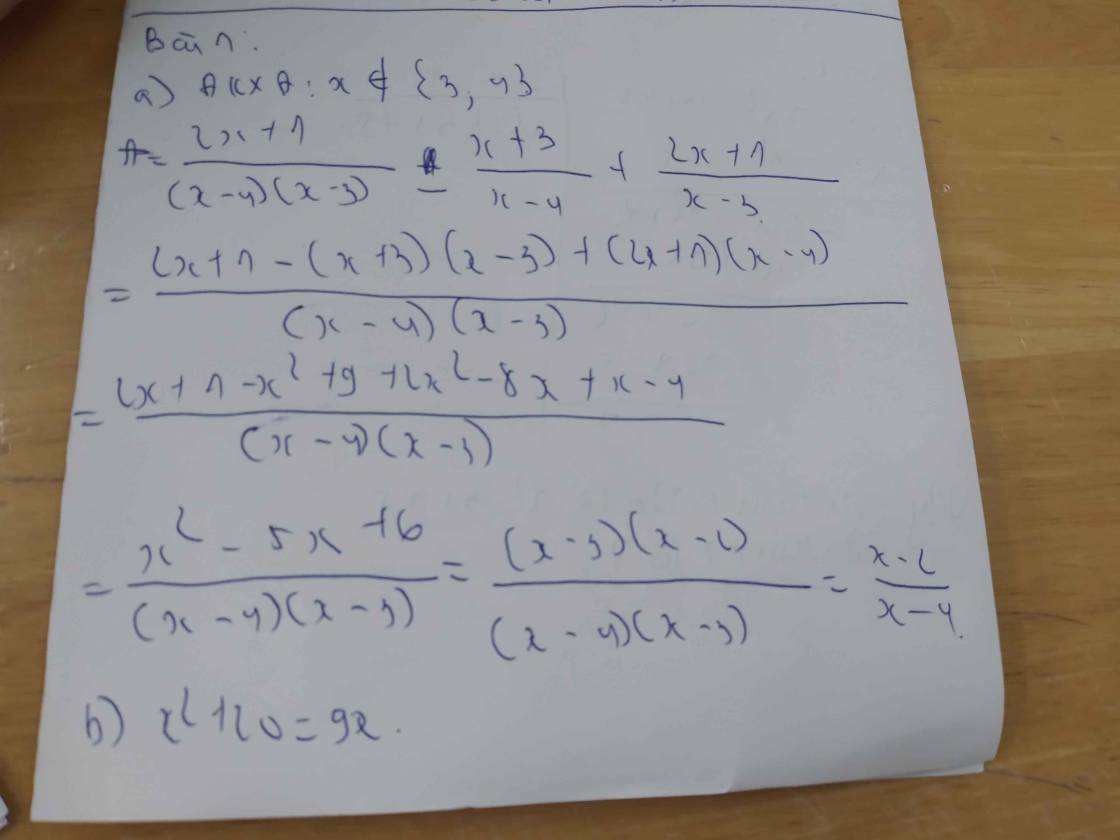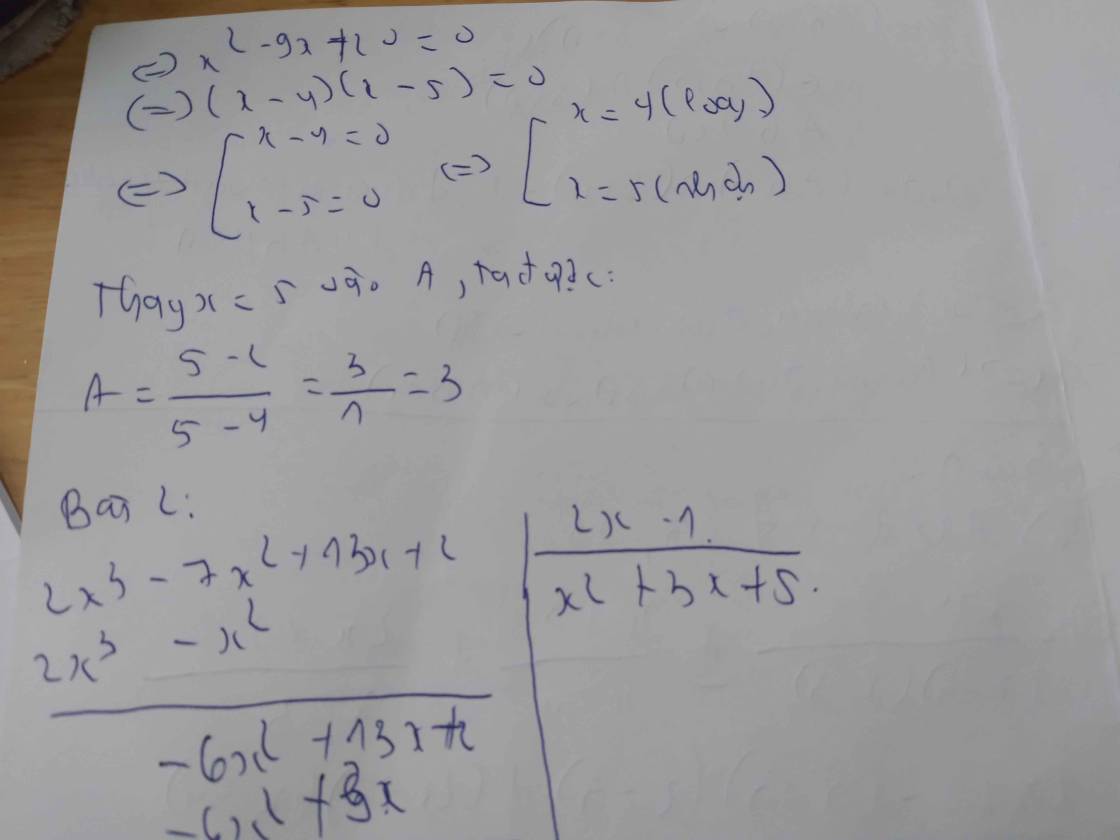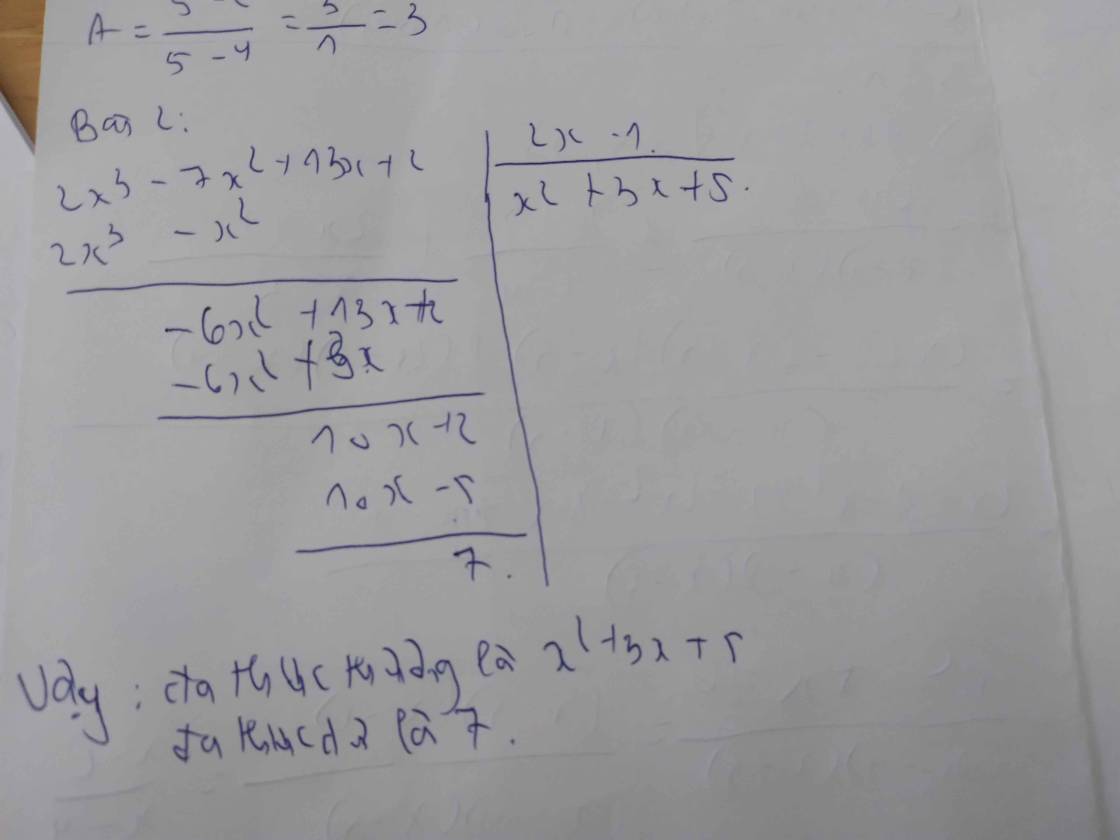Hãy nhập câu hỏi của bạn vào đây, nếu là tài khoản VIP, bạn sẽ được ưu tiên trả lời.

Bài 1:
a. $2x^3+3x^2-2x=2x(x^2+3x-2)=2x[(x^2-2x)+(x-2)]$
$=2x[x(x-2)+(x-2)]=2x(x-2)(x+1)$
b.
$(x+1)(x+2)(x+3)(x+4)-24$
$=[(x+1)(x+4)][(x+2)(x+3)]-24$
$=(x^2+5x+4)(x^2+5x+6)-24$
$=a(a+2)-24$ (đặt $x^2+5x+4=a$)
$=a^2+2a-24=(a^2-4a)+(6a-24)$
$=a(a-4)+6(a-4)=(a-4)(a+6)=(x^2+5x)(x^2+5x+10)$
$=x(x+5)(x^2+5x+10)$
Bài 2:
a. ĐKXĐ: $x\neq 3; 4$
\(A=\frac{2x+1-(x+3)(x-3)+(2x-1)(x-4)}{(x-3)(x-4)}\\ =\frac{2x+1-(x^2-9)+(2x^2-9x+4)}{(x-3)(x-4)}\\ =\frac{x^2-7x+14}{(x-3)(x-4)}\)
b. $x^2+20=9x$
$\Leftrightarrow x^2-9x+20=0$
$\Leftrightarrow (x-4)(x-5)=0$
$\Rightarrow x=5$ (do $x\neq 4$)
Khi đó: $A=\frac{5^2-7.5+14}{(5-4)(5-3)}=2$

a: \(P=\left(\dfrac{3x+6}{2\left(x^2+4\right)}-\dfrac{2x^2-x-10}{\left(x+1\right)\left(x^2+1\right)}\right):\left(\dfrac{10\left(x^2-1\right)+3\left(x^2+1\right)\left(x-1\right)-6\left(x+1\right)\left(x^2+1\right)}{\left(x^2+1\right)\left(x+1\right)\left(x-1\right)\cdot2}\right)\cdot\dfrac{2}{x-1}\)
\(=\left(\dfrac{\left(3x+6\right)\left(x^3+x^2+x+1\right)-\left(2x^2+8\right)\left(2x^2-x-10\right)}{2\left(x^2+4\right)\left(x+1\right)\left(x^2+1\right)}\right)\cdot\dfrac{\left(x^2+1\right)\left(x-1\right)\left(x+1\right)\cdot2}{-3x^3+x^2-3x-13}\cdot\dfrac{2}{x-1}\)
\(=\dfrac{-x^4+11x^3+13x^2+17x+16}{\left(x^2+4\right)}\cdot\dfrac{2}{-3x^3+x^2-3x-13}\)

-ĐKXĐ: \(x\ne\pm1\)
\(\dfrac{x\left(1-x^2\right)^2}{1+x^2}:\left[\left(\dfrac{1-x^3}{1-x}+x\right)\left(\dfrac{1+x^3}{1+x}-x\right)\right]\)
\(=\dfrac{x\left(1-x^2\right)^2}{1+x^2}:\left[\left(\dfrac{\left(1-x\right)\left(x^2+x+1\right)}{1-x}+x\right)\left(\dfrac{\left(1+x\right)\left(x^2-x+1\right)}{1+x}-x\right)\right]\)
\(=\dfrac{x\left(1-x^2\right)^2}{1+x^2}:\left[\left(x^2+x+1+x\right)\left(x^2-x+1-x\right)\right]\)
\(=\dfrac{x\left(1-x^2\right)^2}{1+x^2}:\left[\left(x+1\right)^2\left(x-1\right)^2\right]\)
\(=\dfrac{x\left(x-1\right)^2\left(x+1\right)^2}{1+x^2}.\dfrac{1}{\left(x+1\right)^2\left(x-1\right)^2}\)
\(=\dfrac{x}{x^2+1}\)
\(\Rightarrow m=\dfrac{x}{x^2+1}\)
-Khi \(x< 0\), mà \(x^2+1>0\forall x\)
\(\Rightarrow m=\dfrac{x}{x^2+1}< 0\).
\(\Rightarrow m< 0\)
-Vậy khi \(m< 0\) và \(m\ne\dfrac{-1}{2}\) thì \(x< 0\)


